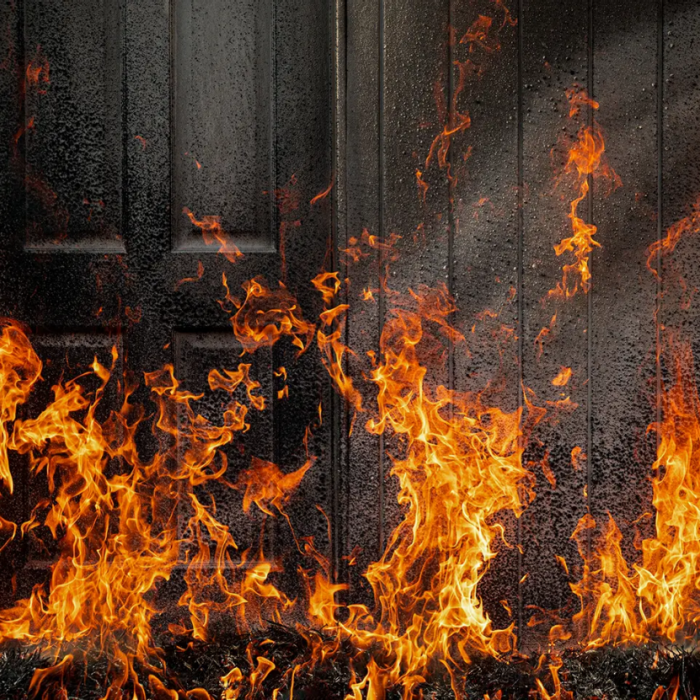Saving homes and lives with fire protective paint

Created by Professor Guan Yeoh and his team of engineers at UNSW, FSA FIRECOAT, opens in a new window is a fully accredited fire-retardant paint that protects homes, buildings and other assets during exposure to flames. The fire protective paint, which has passed stringent testing both locally and abroad, is the first of its kind and is now commercially available throughout the country.

FSA Firecoat Exterior and Interior undercoats create a dense char layer when exposed to flames, which protects the underlying structure from fire damage.
Source: FSA FIRECOAT
After five years of collaboration alongside industry partner Flame Security International, opens in a new window (FSI), Prof. Yeoh, and his team of three full-time research fellows, created the ground-breaking paint to help Australians protect their homes in a simple, accessible, and affordable way.
Using specialised polymer technology, FSA FIRECOAT, opens in a new window can be applied as an undercoat to both internal and external structures, and works on a range of materials including brick, timber, aluminium, steel, concrete and plasterboard. Once flames hit these structures – a dense char layer is formed, which sticks to the wall and ensures flames go no further. “It’s a carbon layer that acts as a fire barrier and gives you additional protection,” explains Prof. Yeoh. Following a fire event, homeowners then scrape off the carbon layer, clean and prep the affected surface area, and simply re-apply the paint.
While the paint is only available in shades of grey and white, users can apply a topcoat to achieve any colour they want.
“You can have a pink house – it doesn’t matter. It doesn’t affect the performance."
- Professor Yeoh
From concept to completion
Prior to developing FSA FIRECOAT, Prof. Yeoh and his team started their research by looking at developing a coating that would remove the risk of fire for cladding. They analysed the chemical compounds that could elevate fire resistance, identified the key binder and looked at additional ingredients that could be compatible with one another. “We started with the binder and then began exploring mixing the binder with carbon and other chemicals that would help promote the growth of a carbon layer,” explains Prof. Yeoh.
The team then applied their new coating to 10 cm x10 cm samples of different materials and ran more than 100 tests to see how effective their formulation was. “There was a lot of trial and error, a lot of adjusting the concentrations of the elements and formulations,” says Prof. Yeoh.
The ‘eureka’ moment however came in 2021 when they found they could coat a subject in the paint and protect it from the flame of a Bunsen burner for more than an hour. “It wasn’t burning at all,” says Prof. Yeoh.
“You could see the blast of the flame impacting the paint coating but the subject itself didn’t experience any burning or degradation.”
- Professor Yeoh
New fire-retardant paint to help prevent the spread of bushfires.

The Centre Director, Prof. Guan Heng Yeoh speaking at the official opening of the ARC Training Centre at UNSW.
Building bushfire resistance
In the event of a bushfire, FSA FIRECOAT is particularly helpful as it has the second highest bushfire rating there is – BAL-40. “Just imagine you have a bushfire coming over the house or a certain area and it’s migrating from one end to the other.
"Even with the direct exposure and impact of flames for up to half an hour – we’re confident that house will still be standing once the fire has moved on.”
- Professor Yeoh
For Prof. Yeoh, it’s important to continue the development of this paint technology to ensure it can be applied across all parts of a home or business. “The walls are one thing but we’re still very mindful about windows and property features that need to maintain a natural timber finish… they need to be protected too.”
This consideration has seen Prof. Yeoh and his team research other possible coatings including a transparent coating to better protect timber structures. “A lot of people don’t want to paint over timber because they want to keep the wooden aesthetic,” he adds. “We want to develop something similar to the FSA FIRECOAT paint on a transparent setting, that you could also apply on windows, too.”
Working as one
Once Prof. Yeoh and his team formalised the paint formulation, industry partner FSI, opens in a new window ensured full-scale testing and certification. “Kudos needs to be given to FSI because they put in a lot of effort to get to the final product,” explains Prof. Yeoh.
The collaboration between FSI and UNSW is just one of many examples of how academia and industry coming together can drive transformative solutions and societal impact. Tony Overstead, FSI Founder and CEO believes this particular partnership has just done this.
“The partnership with UNSW gives us the credibility that comes from working with a world-class university. Professor Yeoh and his team were able to support us with performance testing and administrative needs throughout the entire product commercialisation process.”
Following certification, FSI engaged household hardware and garden centre chain, Bunnings Warehouse, opens in a new window, who have now become a country-wide distributor of the paint.

Collaboration between UNSW and FSI was critical to the success of the testing and certification of the final product.

Field testing of two small houses, one with FIRECOAT and the other without.
Source: FSA FIRECOAT
As the most fire-prone country on the planet, Australia’s need for effective bushfire solutions has never felt more necessary. This has been a key driver for Prof. Yeoh and the work he does.
“My end goal has always been to have a product for the community to use that helps them stay protected."
- Professor Yeoh
"We want them to be able to return to their homes and see them still standing. If we can do that, then I think we’ve done our job well.”
Share this story
Read more
Get in touch and see what’s possible.
Ask how we can help your business, industry, or market through collaboration.



